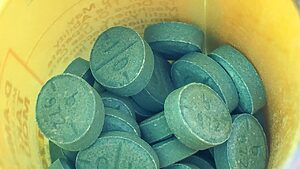If you’re fearful that your loved one has developed a heroin addiction, it can be helpful to understand the signs of heroin use. The sooner a drug problem is identified, the faster a person can begin reclaiming their lives through a comprehensive inpatient heroin addiction treatment program. For more information, call Texas Recovery Center at 844.230.5931.
5 Signs of Heroin Addiction
1. Going “On The Nod”
Heroin is a central nervous system depressant or “downer.” This means that it slows the body down, specifically the blood pressure, breathing, heart, respiratory, and temperature rates. As these internal systems slow, sure signs of these changes will be visible. After the initial rush, or high, of heroin, a drowsy state can set in for several hours. Many users move back and forth between consciousness and unconsciousness while on heroin, alternating from a wakeful to a sleepy state. This is called going “on the nod.”
2. Ignoring Drug-Induced Physical and Mental Health Problems
One of the hallmark signs of heroin addiction is when a person continues to use the drug despite harmful consequences to their health compulsively. Heroin is so addictive that this shift can happen very fast. Heroin is immensely toxic to the brain and body, especially at addiction’s dosages.
Chronic substance use can cause depression and antisocial personality disorder. Adverse physical health effects include insomnia, liver and kidney disease, lung problems, and transmissible diseases like HIV/AIDS and hepatitis B and C. When a person is addicted to heroin, their mind is consumed by thoughts of finding and using the drug. Driven by these compulsive behaviors, drug use continues despite the knowledge of adverse health effects.
3. Signs of Heroin Withdrawal
A significant sign of heroin abuse and addiction is withdrawal. Should an addicted individual not be able to use heroin, they will likely become very sick. Heroin exerts a strong force over the body’s chemical makeup. Instead of relying on naturally-occurring chemicals within the body and brain, the body begins to count on the steady stream of heroin. Without it, the body starts to malfunction, causing:
- Cold flashes
- Goosebumps
- Intense cravings
- Involuntary leg movements
- Muscle and bone pain
- Restlessness
- Trouble sleeping
- Vomiting and diarrhea
Withdrawal symptoms are most severe between one and two days after a person last uses heroin. Typically, symptoms fade after about one week. Heroin withdrawal can become extreme. Symptoms are painful, uncomfortable, and, in some instances, dangerous.
Choosing a medically-supervised detoxification program supports a person’s body as they cleanse and detox from heroin. Contact Texas Recovery Center to learn more about our heroin treatment and detox options.
4. Signs of IV Drug Use
The most common means of using heroin is by injection. This method is highly invasive, and long-term use causes significant damage to a person’s body. Injection sites include the forearm, legs, hands, and feet. If a person is an IV drug user, they may have marks where they inject the drug, including:
- Bruising
- Scabs
- Scarring
- Unhealed needle marks
Injecting heroin into the same vein repeatedly can cause vascular scarring. This is called a track mark. Some individuals heat the needle before they inject the drug. This can leave a black, sooty material at the site of the injection termed a “sooting tattoo.” Chronic drug users may get tattoos on their arms or other locations to hide evidence of frequent drug use.
Repeated injections can be very dangerous, causing infection or inflammation. A person’s skin may appear red and swollen if they have cellulitis. Infection can become severe and cause necrotizing fasciitis, a “flesh-eating disease.” Signs of this condition include dark patches of skin.
5. Drug Paraphernalia
To use heroin, an individual must have some equipment. Items used to transport, store or administer heroin are termed paraphernalia. Spotting these items can help inform you that your loved one is using heroin.
Products used for transporting or storing the drug:
- Small baggies
- Balloons
- Foil squares
Items used for injecting the drug:
- A belt or rubber tubing (used for “tying off” a person’s arm so that the veins are easier to get to)
- Burnt spoon or bottle cap (for liquefying the heroin)
- Cotton balls (for filtering the drug)
- Lighters
- Syringes or needles
Objects used for smoking the drug:
- Burnt aluminum foil (used for “chasing the dragon”)
- Burnt pop can
- Straw (for inhaling vapors from either of the above)
- Pipe
Items used for snorting the drug:
- Cut-off, hollowed-out pens
- Straws
- Rolled dollar bills
- Razor blades
- Hard surface with powdery residue on it
Though rare, some individuals may dilute heroin and place it in a small spray bottle. This “shabanging” method allows the drug to be sprayed into the nose. Frequent users of heroin often keep these items in a small bag or case.
This kit may be hidden in a vehicle, bedroom, bathroom, or other personal space. If you find any of these items, try not to touch them. Additionally, heroin paraphernalia could contain traces of potent illicit drugs cut into the drug. Touching the strongest of these can cause an instant overdose.
Get Help for a Heroin Addiction Today at Texas Recovery Center
We know heroin addiction can be overwhelming, but our heroin addiction treatment Texas Recovery Center can help. our addiction treatments include:
- Inpatient detoxification
- Individualized treatment plans
- Group and individual therapy
- Family counseling
- Recreational therapy
- Aftercare planning
At Texas Recovery Center, a person will learn personalized coping and relapse prevention skills to build the strongest recovery possible. If you or someone you know is addicted to heroin, don’t hesitate to seek help. Our admissions counselors are available 24/7 to answer your questions and get you started on your journey to recovery.
Contact us at 844.230.5931 to learn about heroin abuse and treatment options.












